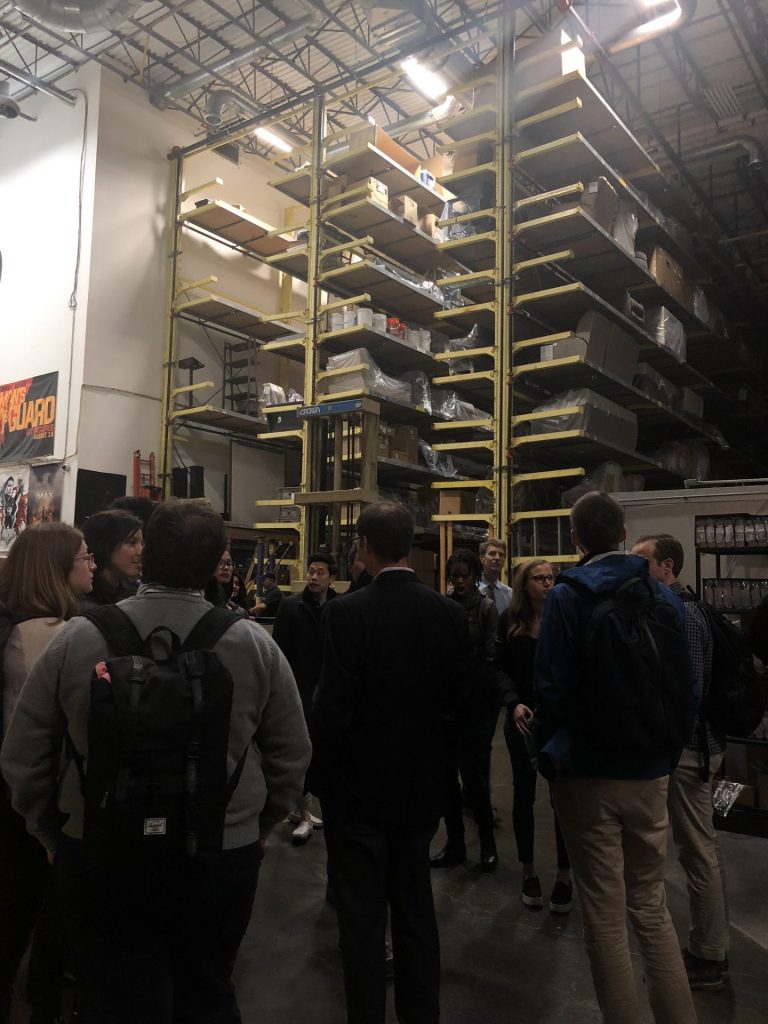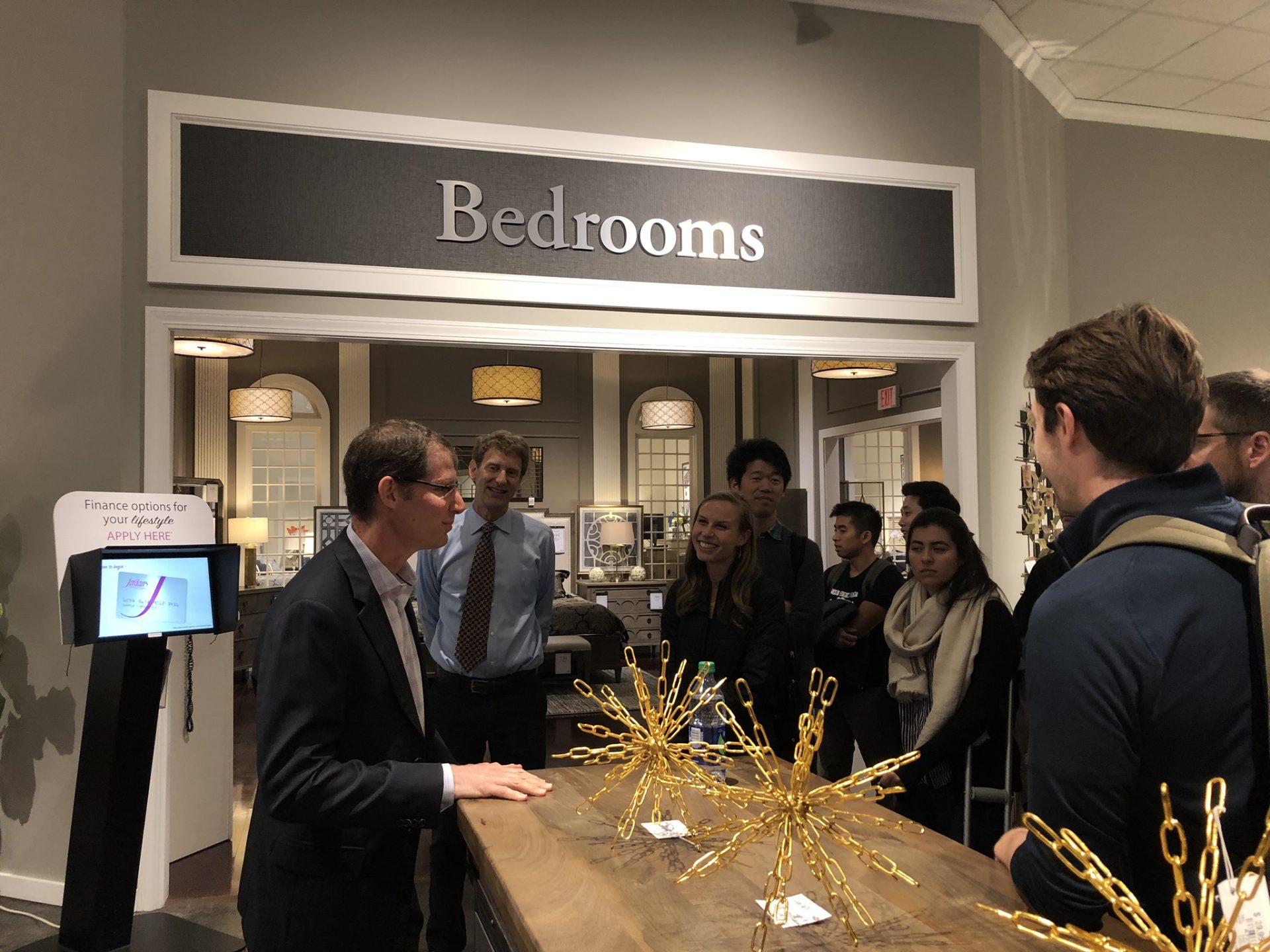
RC students embark on an excursion to New England’s 101-year-old furniture company. Jiyoon Han (MBA ’21) reports.
Professor Michael Toffel and 20 Required Curriculum (RC) students embarked on a Technology and Operations Management (TOM) field trip to Jordan’s Furniture in Reading on October 3, 2019. Jordan’s Furniture is a furniture retailer founded 101 years ago in Waltham, Massachusetts. Today, there are seven locations across New England.
The Reading location comprises 260,000 square feet in retail floor space, including the storefront and the IMAX theater. Students were greeted at the entrance by a Jordan’s employee handing out flyers about credit card financing options. By the entrance on the first floor was a fun panoply of things: a candy shop reminiscent of childhood, an ice cream bar boasting local ingredients, and an indoor jungle including an adventure ropes section. General Manager Scott Wantman asked the group of RC students whether anyone had heard of or had been to Jordan’s Furniture before. One student answered, “I grew up around here. My family came here to watch a movie, and my parents ended up buying a mattress.” Wantman smiled approvingly.
Jordan’s 4K IMAX Theater, an alluring proposition
Jordan’s IMAX theater in Reading is one of the eight IMAX theaters in the world with a 4K laser projector, providing an unparalleled theater experience. Students got a small taste of the 4K IMAX experience as they walked through the theater while The Joker was playing. Jordan’s IMAX theater is one of the top stand-alone IMAX theaters in the country. Two of Jordan’s seven retail stores have a movie theater onsite. The theater not only makes visits fun for customers but also drives revenue for the store itself: Jordan’s saw an increase in sales as soon as the theater opened.
Jordan’s is intentional in its design of the showroom as a space for furniture shopping accompanied by entertainment and fun. President Eliot Tatelman confirms the importance of the physical layout of Jordan’s as part of the larger customer experience. The store layout is partly inspired by Las Vegas Casinos in that they are exciting and require customers to see large portions of the store and a variety of displays and products.
Jordan’s is the brand for couches
Wantman explained, “There are few recognizable brands in the furniture industry, and Jordan’s is effectively the brand. As a furniture company with 101 years of credibility, consumers know and can trust the Jordan’s brand.”
Jordan’s sources products mainly from China. When asked whether they had considered designing or manufacturing their own furniture in-house, the management explained that designing products (especially mattresses) in-house is still under consideration but clarified that this was not currently a top priority.
Jordan’s offers hundreds of different options for couches that are customizable across foams, armrests, fabrics, and prints. The huge warehouse (1 million square feet) and large stores allow Jordan’s to offer a broad assortment of products to a diverse set of customers. To help manage furniture inventory, a complex task for such a large retailer, Jordan’s relies on vendor identification numbers to process custom orders for couches.
Inventory management, shipping, and technology
“We choose partners who can prioritize building and shipping our orders,” Tatelman affirms. He added that the key to sound inventory management is to have high-demand products in stock, while optimizing the square footage of the showroom. Their current inventory management system is facilitated by inventory software that sorts orders and separates them by geography. With the exception of one vendor, every piece of case goods furniture, regardless of where it is manufactured, is inspected at the Jordans warehouse before being delivered to a customer.
A key reason Jordan’s has not actively expanded beyond New England relates to its goal of maximizing its current distribution center. Jordan’s is open to new technology and equipment that can do the manual heavy lifting in a way that does not affect their employees’ job security but rather in a way that promotes safety. Jordan’s has made investments in technology and equipment that are aimed at improved safety and worker satisfaction, not staff reduction. When there is attrition, Jordan’s looks for ways to improve systems or process before rehiring the positions.
Operational hiccups: tax holidays and the Boston Red Sox
An RC student asked when in the year Jordan’s was busiest. Surprisingly, the two weeks leading up to Christmas are typically the slowest. Sales increase around tax holidays and the infamous Red Sox promotion. Because of the nature of some promotions, store traffic and sales end up being compressed into short and very busy time frames. This creates operational challenges on the store side for staffing and subsequently on the warehouse side for ordering, receiving, and delivering.
Jordan’s sponsorship for the Boston Red Sox dates back to 2007. To date, Jordan’s has given away $31 million in furniture. Chief Operating Officer (COO) Peter Bolton, who has been with Jordan’s for 26 years, explained that promotions are complicated. What can be a marketing hit can also cause some operational hiccups. For instance, the first year of the Red Sox promotion in 2007, Jordan’s was strict to enforce mail-in-rebate deadlines. Customers who did not meet the postmark deadline could not redeem the promotional offer. The promotion today is automated and requires no rebate forms for mail-in redemption.
During tax holidays, customers do not get taxed on retail purchases. Again, COO Bolton explained that tax holidays are a nightmare for operations because customers will wait to make purchases, causing irregularities in the management of inventories and backlogs. To offset the negative impact of tax holidays on operations, Jordan’s offers discounts that are greater than the savings customers will get from tax holidays.
The new challenge: expansion into e-commerce
The online channel makes up a small portion of Jordan’s total sales. Jordan’s has always been most focused on maximizing offline sales, and as a result, the company runs the risk of being a showroom for products found online.
Tatelman believes that having physical stores is important and that there will always be a need for them. From the beginning, he has been skeptical of the students who voiced that they were comfortable purchasing a mattress online. Tatelman was eager to have the students answer the question, “How else can we get you to come here?”
“We have to adapt,” declared Bolton. Jordan’s offers professional repair services for furniture purchased by customers. There are more than 30 servicemen on the road every day to fix furniture, which the CEO believes is a core value proposition that Jordan’s has against online furniture companies.
Nonetheless, Jordan’s faces the challenge of becoming a showroom for online furniture companies who can offer similar products at lower price points. Their policy has been to match any retailer selling at better prices. Jordan’s is intent on growing, but cautiously, starting with people, and in a way that retains the current model.
Culture more than anything else
Between balloons, ping pong tournaments, and a spontaneous company outing to Bermuda, Tatelman emphasizes the importance of culture at Jordan’s: “Work is tough enough. You’ve got to have fun. Take the boredom out; make life more interesting. Give them fun and other things to do.” Bolton reiterated that the most important asset is the people. “A title only allows you to do more for more people,” he said.
Matt Tufano (MBA ’21) reflects on the field trip to Jordan’s: “The trip brought TOM to life and helped me see how TOM is not just strictly operations and technology management but can and should be applied to setting culture, designing sales practices, marketing, and advertising. It was neat to see how much they focused on culture and the role of the people in making their operation successful. At every pass, senior leaders emphasized that, for many aspects of the business unit, such as inventory management, logistics, and transportation, employee engagement was critical to achieving operational success.”
 Born in Seoul and raised in New York City, Jiyoon Han (MBA ’21) is a professional coffee cupper and metro map geek. Autumn is her favorite season. Prior to HBS, Jiyoon was a UX designer at Naver, the leading search engine in South Korea. She cares about responsible and equitable development of technology. Jiyoon is currently building a whole-leaf tea business called Pepper Pot Tea Company, which takes its name from a 1920s tea house owned and operated by a female entrepreneur in NYC.
Born in Seoul and raised in New York City, Jiyoon Han (MBA ’21) is a professional coffee cupper and metro map geek. Autumn is her favorite season. Prior to HBS, Jiyoon was a UX designer at Naver, the leading search engine in South Korea. She cares about responsible and equitable development of technology. Jiyoon is currently building a whole-leaf tea business called Pepper Pot Tea Company, which takes its name from a 1920s tea house owned and operated by a female entrepreneur in NYC.


